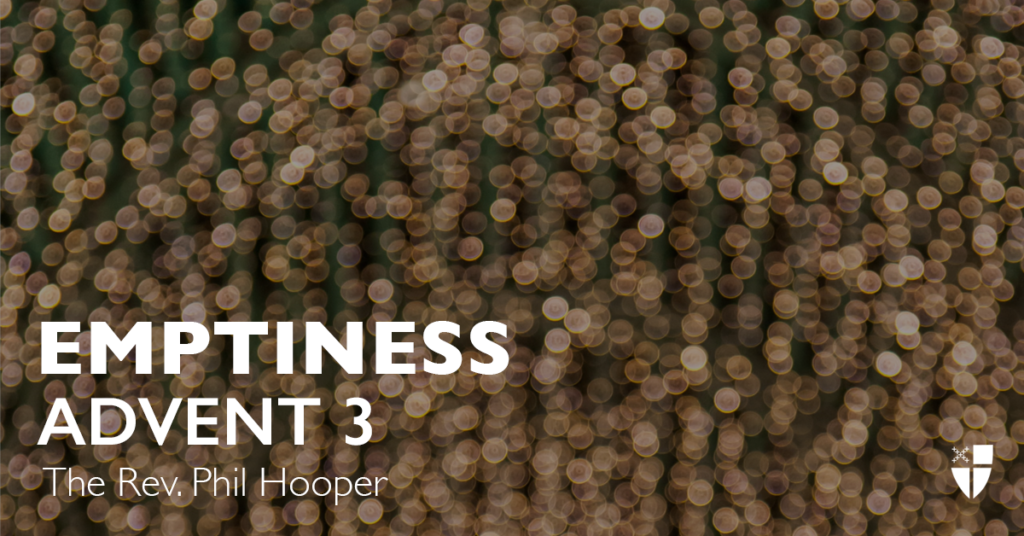Emptiness, Advent 3 (B) – 2020
December 13, 2020

If you have ever stood at the rim of a canyon, you know what it is to comprehend the immense majesty of emptiness. These clefts in the earth, carved by the incessant flow of water over millennia, are rocky vessels holding a world unto themselves.
Peer over the edge and look down into the sky held between the canyon walls—a highway for the howling wind and winged creatures of the air.
Look down upon the stubborn shrubs clinging to the ledges, where tiny crawling things seek their precarious shelter.
And then look down, down, down to the bottom, to the river—the sinuous originator of this landscape, still eroding and shaping the earth in its insistent passage towards a distant sea.
In the canyon, we perceive how negative space has its own power; we find that we are just as compelled by the vastness of what is missing, what has been hollowed out, as we are by what remains. There is a potentiality in the chasm, a certain thick luminousness, a sense of seeing deep into the heart of things that are usually hidden under the surface.
And perhaps it is in just such a wilderness place that we might imagine John the Baptist, his voice crying out, echoing off of the wizened rockface, mingling with dust and birdsong, proclaiming a coming that will soon carve its own path through the petrification of the human heart. A coming that will strip us bare of falsehood and pretension. A coming that will carve out an authentic understanding of ourselves in the cosmic landscape.
Like the emptiness of the canyon, though, our authenticity is predicated, first, upon an honest assessment of that which is not there, in order to reveal the deep truth that remains.
“Who are you?” John is asked.
“I am not the Messiah,” he says.
Are you Elijah? “I am not.”
The prophet? “No.”
Relinquishment of these identity markers is his first act of truth-telling. John knows that he must name the roles to which he is not called before he can affirm that to which he is. And so must we.
How often we wish that we were the Messiah, the long-expected sovereign of our own small dominions. How often we take on the titles offered to us, not because they fit, but because they make us feel more real to ourselves. And how readily we assign these roles to others in order to suit our purposes. But just as the canyon only becomes itself in the void, so, too, with us: in each of our own negations, we get closer to the spare, essential truth of our identity.
“I am,” John admits, “the voice of one crying out in the wilderness, ‘Make straight the way of the Lord.’” A voice, an invisible resonance piercing the air. Nothing more and nothing less than this. And this is exactly what God needs him to be.
John, the man of the empty wilderness, is himself a canyon-like figure, characterized more by spaciousness and depth than by any agenda of self-aggrandizement. He is one whose existence has been shaped to its depths by the Divine flow, and he embodies the way in which giving ourselves over to that movement is the pathway to honest, purposeful existence. He is the exemplar of how our lives become conformed to the shape of Christ—the Way-Made-Clear for the advent of God’s Living Water.
There is much for us to learn from him here, in the watery depths of the canyon, especially in this frenetic and anxious season. Faced with the multiplying needs of our families, our communities, and our planet, we are frequently tempted to take on far more than what we can actually do or be. And even as many of us attempt to slow down and be more attentive in this liturgical season, the world continues to surround us and shout, “Who are you? Who are you?”
But, like John, if we are ever to cultivate the space in ourselves for God to accomplish God’s work, then we must respond with:
I am not the Messiah.
I am not.
No.
We must be willing to disappoint the expectant throng. We must be willing to embrace the emptiness of what we were never meant to be.
And then, perhaps, we will find the one voice that was ours to claim all along.
For John, the purpose of his own voice is clear: the announcement of God’s incarnate promise. And so he baptizes in the river, that agent of transformative power, inviting others to let themselves be scoured by it—to let their layers of defensiveness and artifice be stripped away, to hollow out a space in their hearts in preparation for “the one who is coming after,” the Christ, the one who is making all things new.
And here, in another time and in another wilderness, John’s invitation remains open to us, and it is as urgent as ever because we are still learning who we are and who we are not. Like the canyon, we are still being shaped, still being laid bare to the wind and the light, still becoming as deep and open and vast as God imagines we can become. And, like John, it is only in the cultivation of our own holy emptiness that we will, at last, be the vessels of God’s inbreaking purpose:
to bring good news to the oppressed,
to bind up the brokenhearted,
to proclaim liberty to the captives,
and release to the prisoners;
to proclaim the year of the Lord’s favor,
and the day of vengeance of our God;
to comfort all who mourn. (Isaiah 61:1-2)
Don’t forget to subscribe to the Sermons That Work podcast to hear this sermon and more on your favorite podcasting app! Recordings are released the Thursday before each liturgical date.
Receive Free Weekly Sermons That Work Resources!


